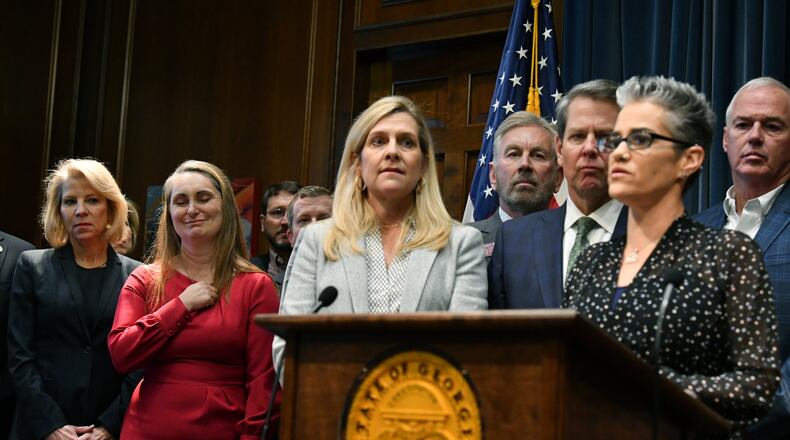As the Georgia state Senate began to debate a building permit bill from Sen. Clint Dixon, R-Buford, last week, his colleague, Sen. Brian Strickland, R-McDonough, rose to ask a question.
“Given that you’ve got this bill on the calendar first, and the First Lady’s bills further down the calendar, is it safe to say you believe the governor’s bills are more important than the First Lady’s bills?” Strickland asked.
Dixon paused. As Gov. Brian Kemp’s floor leader, no legislation takes precedence over a bill from the governor. But Dixon knew the thing to say.
“The answer would be no,” he said. “If mama’s not happy, nobody’s happy.”
The Senate gallery erupted in laughter, but Dixon and others in the chamber knew what those close to Gov. Brian Kemp have known for a long time — that First Lady Marty Kemp’s influence, both in the governor’s mansion and in the General Assembly, is very real.
Nothing demonstrates that better than the issue of human trafficking, a crime in which a victim is kidnaped, coerced, or sold and then used for prostitution or forced labor. Many victims are beaten and drugged. Some are sold to traffickers by their own families.
The legislation Dixon introduced later in the day, which had been brought by the Governor’s office for the First Lady, would add protections for victims and penalties for their perpetrators.
Although Marty Kemp had originally pointed to hurricane recovery and animal welfare as areas she might focus on after her husband was elected governor in 2018, a press conference about human trafficking, along with a book detailing the horrific lives of young victims, changed her mind.
As she learned more, she sometimes woke up in the middle of the night in the governor’s mansion, in tears.
“I told Brian, ‘We’re going to fight. We’re going do what we can to end this here,’” she said in an interview.
Unlike most spouses of new governors, she already knew how to put legislation behind a plan and start counting votes.
Her late father, Bob Argo, an Athens Democrat, served in the state House for 10 years alongside several of the legislators who would eventually vote for her legislation.
“I grew up running around these halls,” she said. “This is not my first rodeo.”
In the years Brian Kemp has been governor, he has passed five bills related to human trafficking, and put forward two more this session, which the Senate passed unanimously after Dixon introduced them.
Senate Bill 33, would allow victims or state officials to sue for damages against traffickers and “bad actors” who know about the crimes, while Senate Bill 34, would let victims seek a name change privately.
Both came from Marty Kemp’s conversations with victims and law enforcement officers around the state.
Other ideas have come through the GRACE commission, a panel of public and private leaders that Gov. Kemp created in 2019, and Marty Kemp co-chairs.
Sherry Boston, the Democratic Dekalb County District Attorney, is a member of the commission. She’s been working for more than a decade on human trafficking issues, which she calls “a huge concern” for her office.
“What the GRACE commission has done really is to try to understand where the gaps were in services in the law, and then be dedicated to filling in those gaps,” she said.
Boston said her office rescues victims of human trafficking every day, “And that rescue can’t end on Day One, when we pull them out, or on Day Two, when we’re able to perhaps hold their offender accountable. It’s about continuing on — and helping victims reclaim their lives.”
State Sen. Michael “Doc” Rhett, a Democrat from Marietta, voted for both of Kemp’s measures in the Senate last week. As a volunteer for the City of Refuge in Atlanta’s West Side neighborhood, he said he often encountered trafficking victims as he checked new residents into the shelter.
“I’d ask, ‘Where are you coming in from?’ They might say Michigan. ‘Do you have any family down here in Atlanta?’ No. ‘Do you have a job? No. Do you have a place to stay? No,” he said. “When it’s a no to those three questions, automatically, you have a red flag that they are probably running from an abusive situation.”
Rhett called this year’s legislation from the First Lady “very helpful.”
“We’d often find out (the women) has been running from city to city to city. They’ve come this far to hide their identity from the perpetrator,” he said. “This would help them feel a little more safe.”
Along with the legislation, Gov. Kemp moved to create a new unit within the Georgia Bureau of Investigation to deal specifically with human traffickers. Since it began in July, the unit has opened 46 investigations.
Also last summer, the state has opened its first intake center for trafficking victims, who had previously been treated as arrested-and-released prostitutes by law enforcement.
Even though Marty Kemp grew up in the halls of the legislature, she said she was never planning to be back as the wife of the governor. But now that she is, she’s using her background and her platform to do something.
“This is a unit, not just him, as a lot of people think,” she said of her family. “We want to make some differences. We want to make some changes.”
The state House will take up this year’s Senate-passed Kemp bills later this session.
About the Author
Keep Reading
The Latest
Featured



